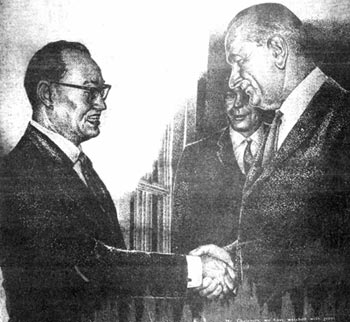Playing with Superpowers
Burma’s generals have a history of juggling relations with Washington and Beijing
If ever the Burmese regime made it clear it preferred “Made in America” to “Made in China,” it would be no surprise to see relations between China and Burma suffer a severe hiccup.
China is now keenly observing Washington’s new policy toward the Burmese regime and Burma’s opposition movement. At the same time, Beijing is observing the unpredictable Naypyidaw regime’s paukphaw (kinship) commitment to China.
 |
| Burma’s former dictator, Ne Win, (left) met then US President Lyndon Johnson in 1966. |
Burmese military officers used Western weapons to counter Chinese-backed insurgents in the past. They have long memories of Chinese chauvinism and Beijing’s efforts to export communism to Burma and install a government sympathetic to Mao Zedong’s communist ideology.
Those days are long gone. China became Burma’s staunchest ally after the regime brutally crushed the pro-democracy uprising in 1988. For the past 21 years, China has adopted its paukphaw policy toward Burma and played an influential role there.
Burma has always firmly supported a “One China” policy and expressed its sympathy to Beijing at the time of the Tiananmen Square massacre in 1989. Burma hastily issued a statement condemning the West when the Chinese embassy in the Serbian capital, Belgrade, was hit in a NATO air strike in 1999.
Perhaps Burmese leaders have had little choice but to embrace Beijing since 1988, in view of worsening relations with the West. However, it can be argued that the strength of ties between Burma and China is grossly overstated and may be an anomaly.
Former dictator Gen Ne Win, who fought British and Japanese occupiers, was always fearful of imperialists. During his reign from 1962 to 1988 and throughout the Cold War, he kept world powers at arm’s length.
Ne Win and his top commanders were well aware of their country’s geopolitical importance, strategically located between China and India.
Ne Win’s neutralist balancing act didn’t prevent him, however, from seeking military aid from the US and Europe when Burma faced a serious threat from Communist China in the late 1960s.
Four years after coming to power in the 1962 military coup, Ne Win visited the US and had lunch at the White House in Washington with then President Lyndon Johnson.
A few months earlier, Ne Win had received US Sen. Mike Mansfield, the first high-ranking US official or legislator to visit Burma since the coup.
Ne Win’s visit to Washington created some apprehension in Beijing, although the Burmese dictator never gave cause for real concern. He was clever enough to appease and exploit Beijing.
One year after the US visit, anti-Chinese riots broke out in Burma, causing Ne Win to placate Beijing and steadily repair strained relations, while still adhering to his country’s neutralist foreign policy.
At a Chinese National Day reception in Beijing, Ba Thein Tin, the leader of the Communist Party of Burma, was mentioned second only to Khmer Rouge leader Pol Pot among distinguished guests at the main table in Beijing.
In December 1977, Ne Win made a surprise visit to Phnom Penh to meet Pol Pot, the first foreign leader welcomed to Cambodia since the Khmer Rouge takeover two years previously.
The visit was intended to break the Khmer Rouge’s international isolation. It certainly paid off, as Beijing increased its economic assistance to Burma and also ordered Burmese Communists to relocate their clandestine radio station to Burmese territory.
Burma’s current military strongman, junta chief Snr-Gen Than Shwe, was then an army captain temporarily serving with Light Infantry Division 101. He was undoubtedly an interested observer of how Ne Win was handling internal and external challenges.
Than Shwe was later assigned to lead Light Infantry Division 88 in northern Burma in countering a communist threat there in the 1980s.
Like many infantry commanders, Than Shwe and his No 2, Dep Snr-Gen Maung Aye, are known to harbor no great love for China.
Beijing somehow miscalculated the eccentric, nationalistic, independent-minded and battle-hardened Burmese army leaders.
1 | 2 next page »
